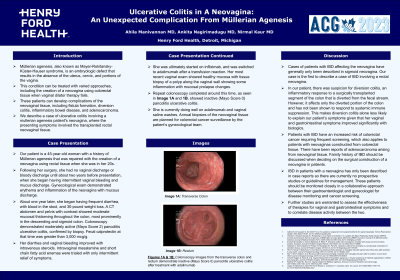Sunday Poster Session
Category: IBD
P0794 - Ulcerative Colitis in a Neovagina – An Unexpected Complication From Müllerian Agenesis
Sunday, October 22, 2023
3:30 PM - 7:00 PM PT
Location: Exhibit Hall

Has Audio

Ahila Manivannan, MD
Henry Ford Health
Detroit, MI
Presenting Author(s)
Ahila Manivannan, MD, Ankita Nagirimadugu, MD, Nirmal Kaur, MD
Henry Ford Health, Detroit, MI
Introduction: Müllerian agenesis is an embryologic defect that results in the absence of the uterus, cervix, and portions of the vagina. These patients can be treated with the creation of a neovagina using colorectal tissue, which can lead to complications including inflammatory bowel disease and adenocarcinoma. We describe a case of ulcerative colitis involving a neovagina of a patient with Müllerian agenesis, where the presenting symptoms involved the transplanted rectal neovaginal tissue.
Case Description/Methods: Our patient is a 45-year-old woman with a history of Müllerian agenesis that was repaired with the creation of a neovagina using rectal tissue when she was 20. Following her surgery, she had no vaginal discharge or bloody discharge until about two years before presentation, when she began experiencing intermittent vaginal bleeding and mucus discharge. About one year later, she began having frequent diarrhea, about 10 to 15 times a day, with blood in the stool. Colonoscopy demonstrated moderately active (Mayo Score 2) pancolitis ulcerative colitis, with biopsies confirming the diagnosis of ulcerative colitis. Fecal calprotectin at that time was greater than 3,000 mcg/g. Her diarrhea and vaginal bleeding improved with intravenous steroids. She was ultimately started on infliximab for control of her symptoms and was switched to adalimumab after a transfusion reaction. Her most recent vaginal exam showed healthy mucosa with tissue biopsy of a polyp along the vaginal wall showing some inflammation with mucosal prolapse changes. Repeat colonoscopy completed around this time showed inactive (Mayo Score 0) pancolitis ulcerative colitis. She is currently doing well on adalimumab and vaginal saline washes, with no significant vaginal discharge or bleeding.
Discussion: There was suspicion for diversion colitis in our patient, which is an inflammatory response to a surgically transplanted segment of the colon that is diverted from the fecal stream. However, it affects only the diverted portion of the colon and has not been shown to respond to systemic immune suppression. This makes our patient’s symptoms more likely to be explained by a combination of diversion colitis and ulcerative colitis. Inflammatory bowel disease in patients with a neovagina has only been described in case reports and there are currently no guidelines for management. These patients should be monitored closely in a collaborative approach between their gastroenterologist and gynecologist for disease monitoring and cancer screening.

Disclosures:
Ahila Manivannan, MD, Ankita Nagirimadugu, MD, Nirmal Kaur, MD. P0794 - Ulcerative Colitis in a Neovagina – An Unexpected Complication From Müllerian Agenesis, ACG 2023 Annual Scientific Meeting Abstracts. Vancouver, BC, Canada: American College of Gastroenterology.
Henry Ford Health, Detroit, MI
Introduction: Müllerian agenesis is an embryologic defect that results in the absence of the uterus, cervix, and portions of the vagina. These patients can be treated with the creation of a neovagina using colorectal tissue, which can lead to complications including inflammatory bowel disease and adenocarcinoma. We describe a case of ulcerative colitis involving a neovagina of a patient with Müllerian agenesis, where the presenting symptoms involved the transplanted rectal neovaginal tissue.
Case Description/Methods: Our patient is a 45-year-old woman with a history of Müllerian agenesis that was repaired with the creation of a neovagina using rectal tissue when she was 20. Following her surgery, she had no vaginal discharge or bloody discharge until about two years before presentation, when she began experiencing intermittent vaginal bleeding and mucus discharge. About one year later, she began having frequent diarrhea, about 10 to 15 times a day, with blood in the stool. Colonoscopy demonstrated moderately active (Mayo Score 2) pancolitis ulcerative colitis, with biopsies confirming the diagnosis of ulcerative colitis. Fecal calprotectin at that time was greater than 3,000 mcg/g. Her diarrhea and vaginal bleeding improved with intravenous steroids. She was ultimately started on infliximab for control of her symptoms and was switched to adalimumab after a transfusion reaction. Her most recent vaginal exam showed healthy mucosa with tissue biopsy of a polyp along the vaginal wall showing some inflammation with mucosal prolapse changes. Repeat colonoscopy completed around this time showed inactive (Mayo Score 0) pancolitis ulcerative colitis. She is currently doing well on adalimumab and vaginal saline washes, with no significant vaginal discharge or bleeding.
Discussion: There was suspicion for diversion colitis in our patient, which is an inflammatory response to a surgically transplanted segment of the colon that is diverted from the fecal stream. However, it affects only the diverted portion of the colon and has not been shown to respond to systemic immune suppression. This makes our patient’s symptoms more likely to be explained by a combination of diversion colitis and ulcerative colitis. Inflammatory bowel disease in patients with a neovagina has only been described in case reports and there are currently no guidelines for management. These patients should be monitored closely in a collaborative approach between their gastroenterologist and gynecologist for disease monitoring and cancer screening.

Figure: Repeat colonoscopy after starting treatment showed inactive (Mayo Score 0) pancolitis ulcerative colitis, with the transverse colon and rectum pictured here
Disclosures:
Ahila Manivannan indicated no relevant financial relationships.
Ankita Nagirimadugu indicated no relevant financial relationships.
Nirmal Kaur indicated no relevant financial relationships.
Ahila Manivannan, MD, Ankita Nagirimadugu, MD, Nirmal Kaur, MD. P0794 - Ulcerative Colitis in a Neovagina – An Unexpected Complication From Müllerian Agenesis, ACG 2023 Annual Scientific Meeting Abstracts. Vancouver, BC, Canada: American College of Gastroenterology.
